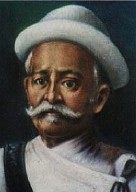
Back સરદાર ભક્તિ થાપા Gujarati भक्ति थापा Hindi भक्ति थापा MAI भक्ति थापा Nepali Bhakti Thapa SIMPLE
This article has multiple issues. Please help improve it or discuss these issues on the talk page. (Learn how and when to remove these template messages)
|
Bhakti Thapa (Godar) | |
|---|---|
| सरदार भक्ति थापा क्षेत्री | |
 Portrait of Sardar Bhakti Thapa Chhetri in his 70s | |
| Grand Old Man of Deothal | |
| Personal details | |
| Born | 1741 Lamjung District, Nepal |
| Died | 1815 (aged 74) Deuthal, Garhwal Division, Kingdom of Nepal (present day Uttarakhand, India) |
| Children | Ram Das Thapa Chhetri |
| Military service | |
| Battles/wars | Anglo-Nepalese war |
Bhakti Thapa Chhetri (Nepali: भक्ति थापा क्षेत्री; 1741 A.D. Lamjung, Nepal – 1815 A.D.) was a Nepali military commander and administrator in the Kingdom of Nepal. Initially, he served the Kingdom of Lamjung. He is considered one of the national heroes of Nepal.
Grand Old Man Bhakti Thapa Chhetri as a punwar Thapa was the Sardar (commander) of Lamjung state, so he fought against Gorkhali in the battle from the side of Kehari Narayan, the King of Lamjung. After the fall of Lamjung in the battle against the Gorkhali (Nepali) forces, he was captured and brought to Kathmandu as a prisoner of war. Later he was appointed as sirdar (one of the sirdars) in the Nepali army. Just two years after the unification of Jumla, he was made the supreme commander (Sardar) of the Nepalese army stationed to the west of the capital in a region that stretched almost up to the Sutlej river, and also the administrator of this region. Sardar Bhakti Thapa's great success in the unification of Jumla District made him a legendary figure. He was a patriot involved in the Anglo-Nepali War. His most important contribution in the war was at the western front of Deothal.[1][2][3]
In the Anglo-Nepal war, Sardar Bhakti Thapa was controlling operation of the whole Western Region of Nepal from the fort of Malaun, whereas the fort of Surajgadh was in the south of this fort. As the British forces had control over the fort of Deuthal, 1,000 yards (910 m) away from Malaun fort, the whole of the Western Region was at stake, which made Sardar Bhakti Thapa Chhetri go to the battlefield, taking naked Khukuri and sword on his hand, along with 2,000 Nepali soldiers amidst the fierce gun-firing of the British army on April 16, 1815. There was fierce fighting between the two forces, killing 100 soldiers of the British army while all the officers were killed except only on arsenal. In this battle when Sardar Bhakti Thapa Chhetri tried to capture a British cannon, he was hit by the bullet at his heart. The Major David Ochterlony, handed over very respectfully to the Nepali army, the dead body of Sardar Bhakti Thapa Chhetri after covering it with dosalla (a woollen shawl). The very next day, his body was cremated with the due state guard of honour. His two wives committed Sati (burning themselves on their husband's pyre). Before going to the battlefield, he had handed over his grandson to Bada Kaji Amar Singh Thapa Chhetri. Sitting at the foot of the flag of Nepal, Bada Kaji Amar Singh Thapa Chhetri and Ram Das, the son of Sardar Bhakti Thapa Chhetri, encouraged the Nepalese army looking around at the sight of war. The Anglo-Nepal war took a different turn after the end of this battle. The way Sardar Bhakti Thapa Chhetri laid down his life at the Deothal battle has become a legend in Nepali history.
He was Thapa Chhetri. He belonged to Punwar Thapa clan.[4]
- ^ "Information, History, Biography about Bhakti Thapa :National Hero of Nepal". ImNepal.com. 2016-05-15. Retrieved 2017-06-11.
- ^ Poudel, Ramesh Prasad (2010-08-25). "NEPAL: BHAKTI THAPA:-". NEPAL. Retrieved 2017-06-11.
- ^ ScoopWhoop (2016-08-17). "The Story Of The Nepali Warrior Whose Heroics Inspired The British To Regiment The Gurkhas". ScoopWhoop. Retrieved 2017-06-11.
- ^ "Plea to declare Bhakti Thapa a martyr - The Himalayan Times". thehimalayantimes.com. 31 January 2004. Retrieved 24 April 2018.
© MMXXIII Rich X Search. We shall prevail. All rights reserved. Rich X Search